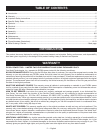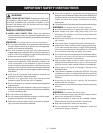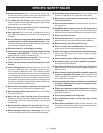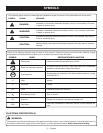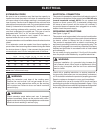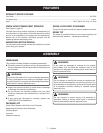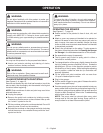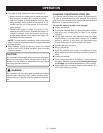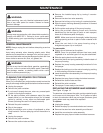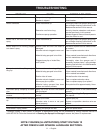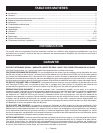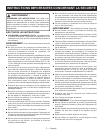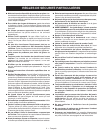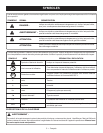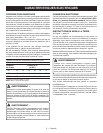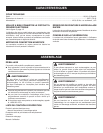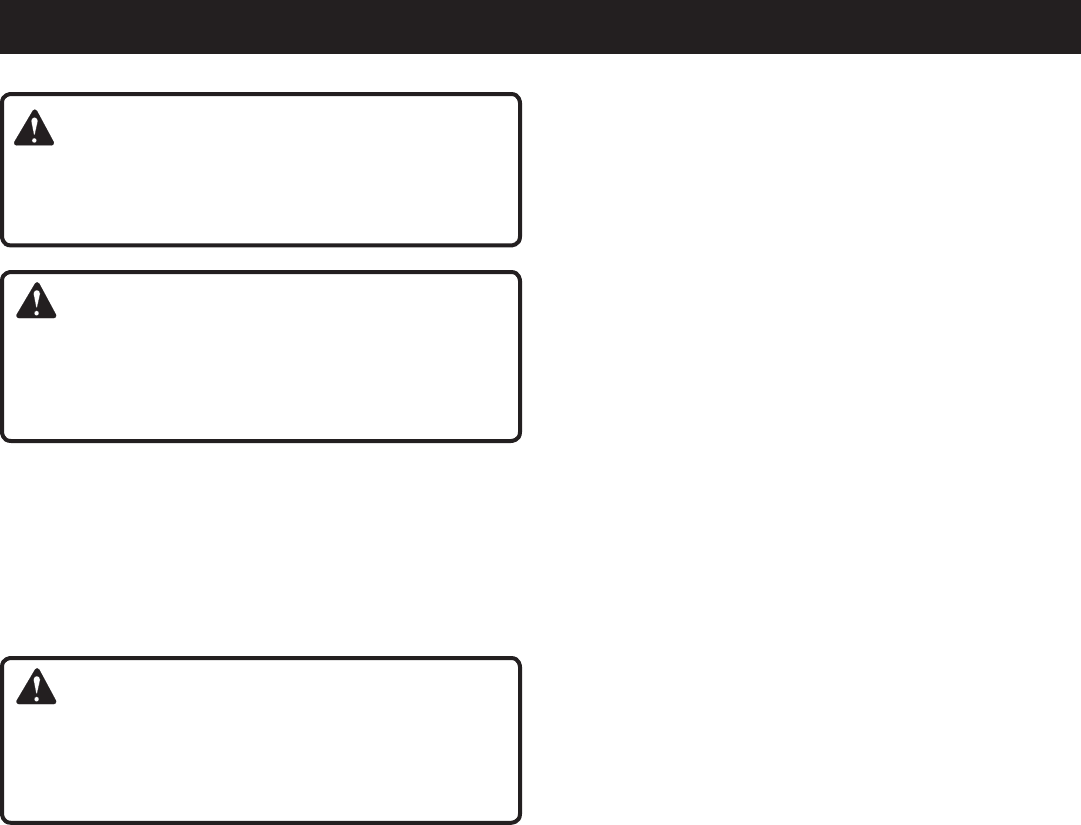
10 — English
MAINTENANCE
WARNING:
When servicing, use only identical replacement parts.
Use of any other parts can create a hazard or cause
product damage.
WARNING:
Always wear eye protection with side shields marked to
comply with ANSI Z87.1. Failure to do so could result
in fluids entering your eyes resulting in possible serious
injury.
GENERAL MAINTENANCE
NOTE: Always unplug the unit before attempting a service
operation.
Avoid using solvents when cleaning plastic parts. Most
plastics are susceptible to damage from various types of
commercial solvents and may be damaged by their use. Use
clean cloths to remove dirt, dust, oil, grease, etc.
WARNING:
Do not at any time let brake fluids, gasoline, penetrating
oils, etc., come in contact with plastic parts. Chemicals
can damage, weaken, or destroy plastic which could
result in serious personal injury.
CLEANING THE SPRAYER FOR STORAGE
See Figures 8 - 9, page 13.
When you’ve finished your project and are ready to store the
sprayer, a thorough cleaning and lubrication is recommended.
Unplug the sprayer.
Remove the paint container.
If you haven’t already done so, return any unused paint
or stain to its original container.
Fill the paint container with lukewarm water (for water
based paints) or non-flammable solvent (for oil-based
paints or varnish), or any other non-flammable paint
thinner (following the use of oil-based products).
Reinstall the paint container.
Plug in the sprayer.
Spray the solution onto a piece of cardboard or other
scrap material. Continue spraying until all the solution is
used.
Unplug the sprayer.
Remove the paint container.
Remove the suction tube and filter.
Remove the installed spray tip by turning it counter-
clockwise.
Remove the atomizer valve assembly.
Remove the locking nut by turning it counterclockwise.
Slide the pump housing assembly/container lid forward
off the sprayer.
Pull the piston and spring off the pump housing.
Using the provided cleaning brush and a solution
determined by the last type of paint or stain sprayed,
clean all of the above parts thoroughly.
NOTE: Make sure to scrub thoroughly inside the pump
housing opening so that no paint or stain material is left
behind.
Clean the vent hole in the pump housing using a
straightened paper clip or toothpick.
To reassemble:
Place a line of lubricant on the piston.
NOTE: Once the provided lubricant has been used,
vegetable oil or a similar type of oil may be substituted.
Slide the spring back onto the piston.
Insert the piston and spring assembly inside the back of
the pump housing.
Replace the pump housing assembly/container lid into
the sprayer.
Replace the locking nut on the motor housing by pushing
in while rotating clockwise to secure.
Insert the atomizer valve assembly into the pump housing
front opening.
Replace the spray tip and rotate clockwise to secure.
Reinstall the suction tube and filter.
Reinstall the paint container.
The sprayer is now ready to be stored.
REPLACING THE ATOMIZER VALVE ASSEMBLY
See Figure 10, page 13.
The atomizer valve causes the paint or stain material to spin
as it comes out of the sprayer. After 7 to 10 gallons of paint
or stain, the atomizer valve may no longer produce a good
spray pattern and may need to be replaced.
To replace:
Unplug the sprayer.
Rotate the spray tip counterclockwise and remove.
Remove the atomizer valve assembly and discard.
Install the new atomizer valve assembly.
Replace the spray tip and rotate clockwise to secure.



